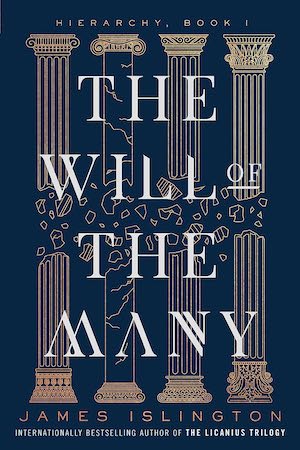Howdy there! It’s been a while, mainly because I’ve been reading all sorts of books and writing all sorts of stuff, and got temporarily distracted from my quest to find great new stories that are ripe for adaptation. But then I read The Will of the Many by James Islington, an imaginative treat for any reader, and an exciting, easy-to-visualize story that practically begs for the onscreen treatment.
The Story So Far
Australian author James Islington has become a staple among many fantasy readers in the last ten years. I’ve heard heaps of praise showered upon the The Licanius Trilogy, and The Will of the Many kicked off a new series with plenty of style to spare.
Rumblings of adaptations reached Reddit, and in a comment during an AMA, Islington said:
You know, it’s such a hard question because there’s a ton of people whose work I admire greatly, and part of me thinks how amazing it would be for them to produce something off my stories—but on the flip side, the most successful ones tend to be those who have a really singular visions for what they’re doing. And if there was an adaption of my work, even understanding that it’s a very different medium, I’d want some level of input into how it was done too… so without sitting down and discussing specifics with them, it’s actually really difficult to say who’d be a good choice!
That’s a few too many ‘ifs’ and ‘woulds’ to suggest any concrete evidence of an adaptation, but it’s nice to know Islington thinks about it. He goes on to say his dream collaboration would be with the team behind Netflix’s Arcane (the animated series based in Riot Games’ League of Legends universe).
You know the drill, Reactor readers: In the face of little to no evidence of planned adaptations, I will beg for one anyway! Here’s why…
Buy the Book


The Will of the Many
A Fantasy Take on Ancient Rome
How often do you think about the Roman Empire? For James Islington, the answer is undoubtedly “a whole helluva lot”—the setting of The Will Of The Many is a twisted fantasy riff on the Roman Empire in which hierarchy permeates every aspect of the culture. The magic system involves individuals “ceding” a portion of their life force (called “Will”) to those above them in the system, thereby making the higher-ups stronger and more powerful.
At the top of society are three governing sectors: Military, Religion, and Government. While they ostensibly work together to oversee their various areas of expertise, they naturally quarrel and bicker, with each one seeking to garner power and influence over the other sectors.
Our protagonist is Vis, prince of Suus, one of the last kingdoms conquered by the now-ubiquitous Catenan Empire. Vis does not cede to anyone and refuses to participate in the magic system. Instead, he uses his training from the glory days of Suus to win fights in underground battles for money. He ventures from one place to the next, hiding his true identity and avoiding capture or discovery by hostile Catenans.
It’s a great hook, and it could be a visual marvel on screens, using the grandeur of Ancient Rome as a stylistic foundation.
Fight The Power
I’ve heard The Will Of The Many referred to as a “dudebro” fantasy or a “power trip” fantasy, and I see where these criticisms come from. Vis is certainly good at everything. He wins fights with brutes far stronger than he is. He outsmarts the smartest smartypants in many rooms. He is amazing at the Catenan fantasy analog for chess. Some readers have criticized this characterization and dismissed The Will of the Many as a result. Of course, not every book will appeal to every reader, but (speaking as a dude, I supposed, but also someone who reads a ton of different kinds of fantasy) I personally thought The Will of the Many was electric. But even putting my personal preferences and biases aside, I would argue that Islington is doing something interesting with the typical hypercompetent fantasy protagonist.
Of course Vis is good at everything. He grew up in luxury. He had money and privilege. He had the best teachers. He’s learned many languages and fighting styles. But then, Islington embroils Vis in a world where he is effectively powerless despite his many skills and advantages. Vis is adopted by a magnate and tasked with discovering the secrets of the Catenan Academy, an elite school where students learn to use Will. But various influences start to tug Vis in different directions, and he has to navigate a volatile social environment on his own while seeking out dangerous secrets and figuring out who he can trust (if anyone).
In short, Vis’s hypercompetencies are effectively nerfed by his circumstances. He has to use his skills as tools to navigate a completely foreign environment, keep his identity a secret, and work as an operative for people far more powerful than he is. Read this way, The Will Of The Many hurtles along with incredible momentum—we don’t follow Vis as he learns how to fight, lie, or play games; instead, we pick up with him as he’s thrust into a dangerous and precarious situation, and watch as he must deploy all of those skills from his earlier life in order to stay alive. From the opening scene, an adaptation could introduce us to Vis as an adept and capable protagonist without bogging us down in his origin story.
There’s also the fact that the Catenan Empire is obsessed with status and rank. Vis outright rejects this philosophy, and fights against the system even as he works to take it down from the inside. Avatar: The Last Airbender’s Prince Zuko comes to mind as a character in similar circumstances: a cast-out royal who must struggle against an oppressive empire with seemingly infinite power. In both cases, it’s a compelling premise, rife with tension and challenges every step of the way.
Too Cool For Magic School
I realize I’ve barely touched on the Academy, the island-based school where much of The Will To The Many takes place. I don’t want to spoil any prospective readers here, but it’s one of my favorite elements of the book. The Academy is a magic school without actual magic—as in, you literally cannot enter the school if you’re ceding Will to someone (or receiving power from someone else).
The school and its home island are also littered with deep history and plentiful mysteries, which Vis begins to unlock slowly but surely. Islington turns a common trope on its head and creates set pieces that would make for perfect, climactic onscreen action.
No spoilers, but before I wrap this up, please allow me just one comment about the ending of The Will Of The Many: holy shit. That is all.
Outlook: Who The Heck Knows?
It’s hard to predict Hollywood these days. It’s a fickle mistress. The appetite for fantasy shows ebbs and flows, but I truly think The Will Of The Many could be a prime suspect for adaptation, and a hit with audiences craving a series that does something new and different with the trappings of high fantasy and fabulous setting.










